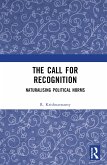The Psychology of Political Communicators
How Politicians, Culture, and the Media Construct and Shape Public Discourse
Herausgeber: Feldman, Ofer; Zmerli, Sonja
The Psychology of Political Communicators
How Politicians, Culture, and the Media Construct and Shape Public Discourse
Herausgeber: Feldman, Ofer; Zmerli, Sonja
- Gebundenes Buch
- Merkliste
- Auf die Merkliste
- Bewerten Bewerten
- Teilen
- Produkt teilen
- Produkterinnerung
- Produkterinnerung
In this timely study, Ofer Feldman, Sonja Zmerli and their team of experts shed light on the multiple ways communication affects political behavior and attitudes. Collectively, the essays form a solid foundation on which to understand the different roles language plays in the conduct of politics.
Andere Kunden interessierten sich auch für
![Political Vocabularies Political Vocabularies]() Conal CondrenPolitical Vocabularies140,99 €
Conal CondrenPolitical Vocabularies140,99 €![Talking Donald Trump Talking Donald Trump]() Jennifer SclafaniTalking Donald Trump78,99 €
Jennifer SclafaniTalking Donald Trump78,99 €![The Psychology of Translation The Psychology of Translation]() The Psychology of Translation160,99 €
The Psychology of Translation160,99 €![A Critical Discourse Study of the Chinese Dream A Critical Discourse Study of the Chinese Dream]() Junchen ZhangA Critical Discourse Study of the Chinese Dream189,99 €
Junchen ZhangA Critical Discourse Study of the Chinese Dream189,99 €![The Call for Recognition The Call for Recognition]() R. KrishnaswamyThe Call for Recognition160,99 €
R. KrishnaswamyThe Call for Recognition160,99 €![New Labour, New Language? New Labour, New Language?]() Norman FaircloughNew Labour, New Language?187,99 €
Norman FaircloughNew Labour, New Language?187,99 €![Language and Situation Language and Situation]() Michael GregoryLanguage and Situation125,99 €
Michael GregoryLanguage and Situation125,99 €-
-
-
In this timely study, Ofer Feldman, Sonja Zmerli and their team of experts shed light on the multiple ways communication affects political behavior and attitudes. Collectively, the essays form a solid foundation on which to understand the different roles language plays in the conduct of politics.
Hinweis: Dieser Artikel kann nur an eine deutsche Lieferadresse ausgeliefert werden.
Hinweis: Dieser Artikel kann nur an eine deutsche Lieferadresse ausgeliefert werden.
Produktdetails
- Produktdetails
- Verlag: Taylor & Francis
- Seitenzahl: 238
- Erscheinungstermin: 1. Oktober 2018
- Englisch
- Abmessung: 229mm x 152mm x 16mm
- Gewicht: 508g
- ISBN-13: 9781138596184
- ISBN-10: 1138596183
- Artikelnr.: 57051155
- Herstellerkennzeichnung
- Libri GmbH
- Europaallee 1
- 36244 Bad Hersfeld
- gpsr@libri.de
- Verlag: Taylor & Francis
- Seitenzahl: 238
- Erscheinungstermin: 1. Oktober 2018
- Englisch
- Abmessung: 229mm x 152mm x 16mm
- Gewicht: 508g
- ISBN-13: 9781138596184
- ISBN-10: 1138596183
- Artikelnr.: 57051155
- Herstellerkennzeichnung
- Libri GmbH
- Europaallee 1
- 36244 Bad Hersfeld
- gpsr@libri.de
Ofer Feldman is a Professor of Political Psychology and Behavior at the Faculty of Policy Studies, Doshisha University, Kyoto, Japan. He is the author of more than 90 journal articles and book chapters, and more than 100 encyclopedia items, in the fields of political psychology/behavior, communication studies, and Japanese politics, and the sole author, sole editor, and co-editor of 15 books and monographs, including Talking Politics in Japan Today (2004), Seiji shinrigaku [Political Psychology] (in Japanese, 2006), and the Politische Psychologie: Handbuch für Studium und Wissenschaft [Political Psychology: Handbook for Study and Science] (in German, 2015, with Sonja Zmerli). Sonja Zmerli is Professor of Political Science at the Institut d'Études Politiques de Grenoble, France. Her research interests revolve around social capital, civil society, political support, income inequality, and welfare regimes. Her articles have appeared in Public Opinion Quarterly, European Political Science Review, American Behavioral Scientist, and Social Science Research. Most recently, she has co-edited the Handbook on Political Trust (2017, with Tom van der Meer).
1. Introduction: Liberal Democracies and the Study of Political
Communicators [Ofer Feldman and Sonja Zmerli] Part 1: Political Leaders'
Discourse 2. The New American Electoral Politics: How Invited Behavior and
Reality TV Explain Donald Trump's Victory [Michael Alan Krasner] 3.
Political Communicators and Control in Political Interviews in Japanese
Television: A Comparative Study and the Effect of Culture [Ofer Feldman and
Ken Kinoshita] 4. Comparing Japanese and U.S. Leaders' Communication: The
Construction of Meaning in Addresses to the United Nations General Assembly
[Sarah Tanke] Part 2: Populist Communication and Negative Campaigning 5.
They Caused our Crisis! The Contents and Effects of Populist Communication:
Evidence from the Netherlands [Michael Hameleers] 6. Populism in
Self-Directed and Mediated Communication: The Case of the Five Star
Movement in the 2013 Italian Electoral Campaign [Cristina Cremonesi] 7.
Fighting with Fire: Negative Campaigning in the 2015 U.K. General Election
Campaign as Reported by the Print Media [Annemarie Walter] Part 3: Media
Discourse 8. Representations of Televised Debates in the Press and their
Influence on Political Candidates: The Cases of Spain, the U.K., and the
U.S.[Laura Pérez Rastrilla] 9. Non-Systemic Factors Underlying Rapid Change
in Gender-Biased Media Framing of Female Politicians: 2009 and 2013 Israeli
Newspaper Election Coverage [Gilad Greenwald and Sam Lehman-Wilzig] 10. Old
Traps and New Prospects: Gendered Media Images of Leading Female
Politicians in Germany as Evidence for a Contested Modernization of Gender
Knowledge [Dorothee Beck] 11. "Men Prefer Redheads": Media Framing of Polls
and its Effect on Trust in Media [Pazit Ben-Nun Bloom and Marie
Courtemanche] 12. Media Ownership: Propositions for an Extended Research
Agenda [Sonja Zmerli]
Communicators [Ofer Feldman and Sonja Zmerli] Part 1: Political Leaders'
Discourse 2. The New American Electoral Politics: How Invited Behavior and
Reality TV Explain Donald Trump's Victory [Michael Alan Krasner] 3.
Political Communicators and Control in Political Interviews in Japanese
Television: A Comparative Study and the Effect of Culture [Ofer Feldman and
Ken Kinoshita] 4. Comparing Japanese and U.S. Leaders' Communication: The
Construction of Meaning in Addresses to the United Nations General Assembly
[Sarah Tanke] Part 2: Populist Communication and Negative Campaigning 5.
They Caused our Crisis! The Contents and Effects of Populist Communication:
Evidence from the Netherlands [Michael Hameleers] 6. Populism in
Self-Directed and Mediated Communication: The Case of the Five Star
Movement in the 2013 Italian Electoral Campaign [Cristina Cremonesi] 7.
Fighting with Fire: Negative Campaigning in the 2015 U.K. General Election
Campaign as Reported by the Print Media [Annemarie Walter] Part 3: Media
Discourse 8. Representations of Televised Debates in the Press and their
Influence on Political Candidates: The Cases of Spain, the U.K., and the
U.S.[Laura Pérez Rastrilla] 9. Non-Systemic Factors Underlying Rapid Change
in Gender-Biased Media Framing of Female Politicians: 2009 and 2013 Israeli
Newspaper Election Coverage [Gilad Greenwald and Sam Lehman-Wilzig] 10. Old
Traps and New Prospects: Gendered Media Images of Leading Female
Politicians in Germany as Evidence for a Contested Modernization of Gender
Knowledge [Dorothee Beck] 11. "Men Prefer Redheads": Media Framing of Polls
and its Effect on Trust in Media [Pazit Ben-Nun Bloom and Marie
Courtemanche] 12. Media Ownership: Propositions for an Extended Research
Agenda [Sonja Zmerli]
1. Introduction: Liberal Democracies and the Study of Political
Communicators [Ofer Feldman and Sonja Zmerli] Part 1: Political Leaders'
Discourse 2. The New American Electoral Politics: How Invited Behavior and
Reality TV Explain Donald Trump's Victory [Michael Alan Krasner] 3.
Political Communicators and Control in Political Interviews in Japanese
Television: A Comparative Study and the Effect of Culture [Ofer Feldman and
Ken Kinoshita] 4. Comparing Japanese and U.S. Leaders' Communication: The
Construction of Meaning in Addresses to the United Nations General Assembly
[Sarah Tanke] Part 2: Populist Communication and Negative Campaigning 5.
They Caused our Crisis! The Contents and Effects of Populist Communication:
Evidence from the Netherlands [Michael Hameleers] 6. Populism in
Self-Directed and Mediated Communication: The Case of the Five Star
Movement in the 2013 Italian Electoral Campaign [Cristina Cremonesi] 7.
Fighting with Fire: Negative Campaigning in the 2015 U.K. General Election
Campaign as Reported by the Print Media [Annemarie Walter] Part 3: Media
Discourse 8. Representations of Televised Debates in the Press and their
Influence on Political Candidates: The Cases of Spain, the U.K., and the
U.S.[Laura Pérez Rastrilla] 9. Non-Systemic Factors Underlying Rapid Change
in Gender-Biased Media Framing of Female Politicians: 2009 and 2013 Israeli
Newspaper Election Coverage [Gilad Greenwald and Sam Lehman-Wilzig] 10. Old
Traps and New Prospects: Gendered Media Images of Leading Female
Politicians in Germany as Evidence for a Contested Modernization of Gender
Knowledge [Dorothee Beck] 11. "Men Prefer Redheads": Media Framing of Polls
and its Effect on Trust in Media [Pazit Ben-Nun Bloom and Marie
Courtemanche] 12. Media Ownership: Propositions for an Extended Research
Agenda [Sonja Zmerli]
Communicators [Ofer Feldman and Sonja Zmerli] Part 1: Political Leaders'
Discourse 2. The New American Electoral Politics: How Invited Behavior and
Reality TV Explain Donald Trump's Victory [Michael Alan Krasner] 3.
Political Communicators and Control in Political Interviews in Japanese
Television: A Comparative Study and the Effect of Culture [Ofer Feldman and
Ken Kinoshita] 4. Comparing Japanese and U.S. Leaders' Communication: The
Construction of Meaning in Addresses to the United Nations General Assembly
[Sarah Tanke] Part 2: Populist Communication and Negative Campaigning 5.
They Caused our Crisis! The Contents and Effects of Populist Communication:
Evidence from the Netherlands [Michael Hameleers] 6. Populism in
Self-Directed and Mediated Communication: The Case of the Five Star
Movement in the 2013 Italian Electoral Campaign [Cristina Cremonesi] 7.
Fighting with Fire: Negative Campaigning in the 2015 U.K. General Election
Campaign as Reported by the Print Media [Annemarie Walter] Part 3: Media
Discourse 8. Representations of Televised Debates in the Press and their
Influence on Political Candidates: The Cases of Spain, the U.K., and the
U.S.[Laura Pérez Rastrilla] 9. Non-Systemic Factors Underlying Rapid Change
in Gender-Biased Media Framing of Female Politicians: 2009 and 2013 Israeli
Newspaper Election Coverage [Gilad Greenwald and Sam Lehman-Wilzig] 10. Old
Traps and New Prospects: Gendered Media Images of Leading Female
Politicians in Germany as Evidence for a Contested Modernization of Gender
Knowledge [Dorothee Beck] 11. "Men Prefer Redheads": Media Framing of Polls
and its Effect on Trust in Media [Pazit Ben-Nun Bloom and Marie
Courtemanche] 12. Media Ownership: Propositions for an Extended Research
Agenda [Sonja Zmerli]








